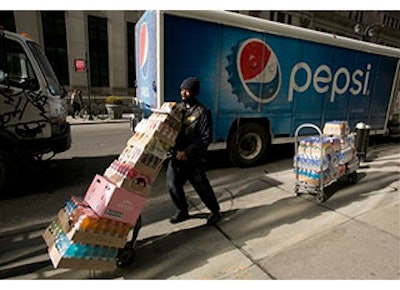
NEW YORK (AP) — No wonder Coke and Pepsi are spending millions of dollars to fight proposed taxes on sugary drinks in California.
PepsiCo reported a higher quarterly profit Thursday as global sales rose, but one weak spot was Mexico. The company said snacks sales volume declined by 3 percent, hurt by a new tax on junkfoods.
Recent declines suffered by Pepsi and Coke in Mexico underscore why the beverage industry is fighting tax proposals on sugary drinks in in San Francisco and nearby Berkeley.
PepsiCo — which makes Frito-Lay chips, Gatorade and Tropicana — reported similar declines in its snacks business for the first half of the year, starting when the tax went into effect.
Coca-Cola, which reports its third quarter results Oct. 21, has also reported beverage volume declines in Mexico for the first half of the year, citing a similar tax on drinks. Mexico has the world's highest per capita consumption of Coca-Cola drinks.
Hugh Johnston, chief financial officer for PepsiCo, said in a phone interview that declines in Mexico were in line with what the company expected. To mitigate the impact of the tax, he said PepsiCo plans to target different package sizes for different outlets.
The taxes in Mexico add one peso, about 7 cents, to the cost of a liter of sugary drinks, and 5 percent of the price to foods with 275 calories or more per 100 grams.
It's not yet clear whether the taxes' impact on consumption will last or how significant it will be over time. And while PepsiCo monitors such tax initiatives around the world, Johnston said he doesn't expect them to become more common.
Back in the U.S., San Francisco and Berkeley are seeking to become the first cities to pass per-ounce taxes on sugary drinks in the upcoming November election. The measures are being closely watched because many say defeats in the Bay Area, which is known for its liberal politics, would be a major blow to advocates of such taxes as a way to improve nutrition. Similar measures in other U.S. cities have failed.
Health advocates have pushed taxes as a tool to cut consumption of calorie-laden junk food, similar to tactics that have successfully been used against cigarettes. Makers of such products say they are being unfairly singled out.
During a conference call with analysts and investors, PepsiCo CEO Indra Nooyi addressed the measures in California and said she believed such "discriminatory taxes" are "wrong."
"We will make our case and hope the voters are sensible enough to look at the right answer," Nooyi said.
Since the start of this year, the American Beverage Association contributed $7.7 million to defeat the proposal in San Francisco alone, according to a filing made this week.
That's far more than the $391,000 in contributions reported by supporters of the tax over the same time.
In the meantime, the beverage industry has touted its commitment to reducing the calories people consume from drinks by more aggressively marketing drinks with less sugar. The industry has also stressed the need to raise awareness about balancing the calories people consume with how much physical activity they get.






















